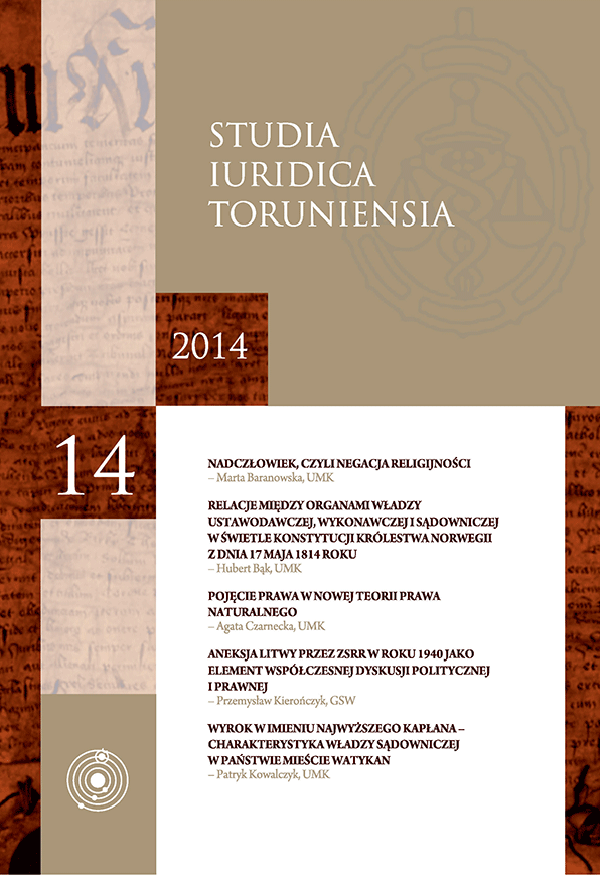Rules and regulations opening the legal system for the international law and the processes of integration in the Federal Republic of Germany
DOI:
https://doi.org/10.12775/SIT.2014.014Keywords
transfer of sovereign powers, Article 23 and 24 of Basic Law for the Federal Republic of Germany, European clause, European Union, constitutional identity (Verfassungsidentitat), the Federal Constitutional Court (Bundesverfassungsgericht)Abstract
The subject of a paper are regulations, which open the legal order for the international law and the processes of integration in the Basic Law of the Federal Republic of Germany. Two names have the dominant position in the german literature: “European Article” (German: Europa-Artikel) and „integrated leverage” (German Integrationshebel). The sovereign rights of the Federal Republic of Germany, which are transferred by the regulations to international organizations and the European Union, are relatively different (in comparison to other EU countries) regulation. Profiles of Articles 23.1 and 24.1 of the Basic Law explain the essence of these regulations. Although in fact the regulations are similar, they concern different subjects – the addressees of hypotheses contained in the articles, which are mentioned above. The term „integrated leverage” is used rarely because article 24 – Intergationshebel – lost its meaning. The term Europa- Artikela pplies to the Federal Republic of Germany’s membership in the European Union (European Community). The Federal Republic of Germany co-created the European Union. The status of a E uropean Union Member State had a profound influence on the changes in the regulations of the Basic Law, including the “European Article”. Assuming that the integration Federal Republic of Germany with the EU is already very developed, the current regulation seems to be sufficient and relevant. There are critics of Article 23, who think that the regulation is useless and that it reaches too far. In the judgment of the Second Senate of the Federal Constitutional Court of 30 June 2009 – the Treaty of Lisbon’s case, the Federal Constitutional Court noticed that, as a result of reforms which were introduced in the Treaty of Lisbon, the European Union may be transform into an unified international organization and also these reforms may reinforce the position of national parliaments.
References
Arndt H.W., Fischer K., Fetzer T., Europarecht, 10. Aufl., Munchen 2010.
Arnold R., Orzecznictwo niemieckiego Federalnego Trybunału Konstytucyjnego a proces integracji europejskiej, „Studia Europejskie” 1999, nr 1.
Bała P., „Tożsamość konstytucyjna” a traktat z Lizbony. Tezy wyroku Federalnego Trybunału Konstytucyjnego z 30 czerwca 2009 r., „Ius Novum” 2010, nr 2.
Banaszkiewicz B., Bogdanowicz P., Relacje między prawem konstytucyjnym a prawem wspólnotowym w orzecznictwie sądów konstytucyjnych państw
Unii Europejskiej, Warszawa 2006, http://www.trybunal.gov.pl/epublikacje/
download/EURO PA_2006.pdf (dostęp: 14 sierpnia 2013 r.).
Barcz J., Między konstytucją a ponadnarodowością: opcja integracyjna konstytucji RFN, Warszawa 1990.
Barcz J., Niemcy: wyrok Federalnego Trybunału Konstytucyjnego z dnia 30 czerwca 2009 r. w sprawie ratyfikacji Traktatu z Lizbony, „Przegląd Sejmowy 2009, nr 6 (95).
Bleckmmann A., Grundgesetz und Volkerrecht, Berlin 1975.
Doerfert C., Europarecht. Die Grundlagen der Europaischen Union mit ihren politischen und wirtschaftlichen Bezugen, 4. Aufl., Munchen 2010.
Galster J., Zasada przychylności wobec prawa międzynarodowego Ustawy Zasadniczej Republiki Federalnej Niemiec, Toruń 1995.
Hesselberger D., Das Grundgesetz. Kommentar fur politische Bildung. Sonderausgabe fur die Landeszentralen fur politische Bildung, 11. Aufl., Neuwid 1999.
Jarass H.D., Pieroth B., Grundgesetz fur die Bundesrepublik Deutschland. Kommentar, 9. Aufl., Munchen 2007.
Kellermann G., Integrationsverantwortung und Verfassungsidentitat – Das Urteil des Bundesverfassungsgerichts zum Vertrag von Lissabon, „Akademie – Kurzanalyse” 2009, Nr. 1.
Kruk M., Kształtowanie konstytucyjnych zasad członkostwa państwa w Unii Europejskiej (wybrane problemy), „Przegląd Sejmowy” 2010, nr 4 (99).
Kustra A., Przepisy i normy integracyjne w konstytucjach wybranych państw członkowskich UE, Toruń 2009.
Pawłowski S., Zjednoczeni w rożnorodności – perspektywa niemieckiego Federalnego Trybunału Konstytucyjnego, w: Konferencja „Unia Europejska:
zjednoczeni w różnorodności” Warszawa, 14–15 grudnia 2010 r., red. C. Mik, Warszawa 2011, http://orka.sejm.gov.pl/WydBAS.nsf/0/9EPrzepisy
F3B748DCCC8B93C1257B2E003ECF19/$file/Zjednoczeni_w_roznorodnosci.
pdf (dostęp: 17 listopada 2013 r.).
Rutynowski J., Witkowska-Chrzczonowicz K., Polityczne i ustrojowe problemy ratyfikacji Traktatu z Lizbony w RFN – wybrane zagadnienia, „Przegląd Sejmowy” 2011, nr 1 (102).
Schmidt-Bleibtreu B., Klein F., Kommentar zum Grundgesetz, 10. Aufl., Munchen 2004.
Silberhorn T., Zur Rolle des deutschen Bundestages nach dem Lissabon-Urteil des Bundesverfassungsgerichts, w: Europaische Integration und deutsche Verfassungsidentitat, 5. Berliner rechtspolitische Konferenz, Hrsg. R.T. Baus, M. Borchard, G. Krings, Sankt Augustin–Berlin 2010.
Starck Ch., Ustawa Zasadnicza po 60 latach. Niemieckie i europejskie perspektywy, „Przegląd Sejmowy” 2009, nr 6 (95).
Tuchowska M., Suwerenność – pojęcie oraz ewolucja idei, w oparciu o akty ustrojowe państw europejskich, w: Konstytucyjnoprawne i polityczne aspekty członkostwa w Unii Europejskiej, red. A. Kustra, Toruń 2009.
Wojtyczek K., Zasada otwartej państwowości w Ustawie Zasadniczej RFN, „Przegląd Sejmowy” 2009, nr 6 (95).
Wojtowicz K., Otwarcie systemu konstytucyjnego Niemiec na sprawy jedności Europy, „Przegląd Sejmowy” 2009, nr 6 (95).
Wojtowicz K., Poszanowanie tożsamości konstytucyjnej państw członkowskich Unii Europejskiej, „Przegląd Sejmowy” 2010, nr 4 (99).
Downloads
Published
How to Cite
Issue
Section
Stats
Number of views and downloads: 507
Number of citations: 0



